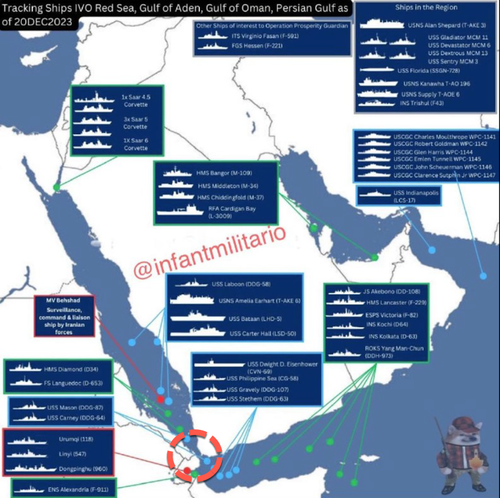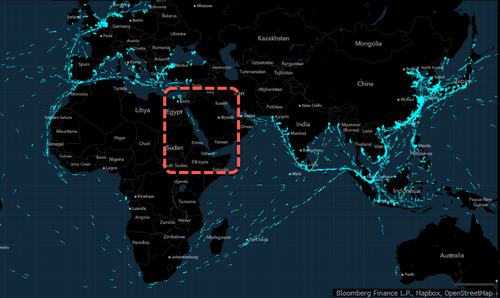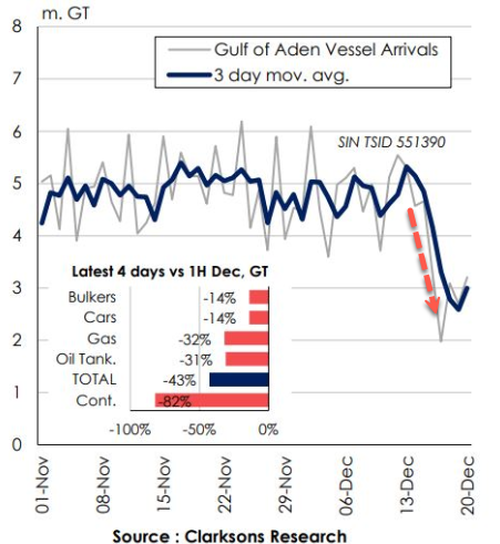Pentagon's Operation Prosperity Guardian "Falls Apart" As Spain, Italy, France Reject Request
Australia is the latest country to reject a request from the United States to send warships to the Red Sea under the command of the Pentagon's Operation Prosperity Guardian to protect commercial vessels along the critical maritime trade route from Iran-backed Houthi.
Defense Minister Richard Marles told Sky News that Australia's military would not send a "ship or a plane" to the Red Sea but would triple the number of troops for the US-led maritime force.
"We need to be really clear around our strategic focus and our strategic focus is our region," Marles said.
The Australian Government continues to work with the United States and other partners in support of the international rules-based order in the Middle East and surrounding region.
— Richard Marles (@RichardMarlesMP) December 21, 2023
The Pentagon's formation of Operation Prosperity Guardian, a new task force to protect shipping from Houthi drone and missile attacks in the Bab Al-Mandeb Strait and the Red Sea, requires increased warship patrols by the US and allies. This will create a security umbrella over commercial vessels to defend from attacks.
Reuters said about twenty countries have signed up for the Pentagon's new operation. However, several countries, including Australia, Spain, Italy, and France, have rejected the Pentagon's request to participate in the operation.
Spain's Defence Ministry said it would only participate in NATO-led missions or European-coordinated operations - not ones commanded by the Pentagon:
"We will not participate unilaterally in the Red Sea operation."
Italy's Defence Ministry voiced similar concerns, indicating it would send naval frigate Virginio Fasan to the Red Sea but only respond to requests by Italian shipowners.
"Operation Prosperity Guardian in the Red Sea has practically Collapsed as France, Spain, and Italy have all announced their Withdrawal from the US Command Structure for the Operation, with the Three Nations stating they will only conduct further Maritime Operations under the Command of NATO and/or the European Union and not the United States," X account OSINTdefender wrote.
Operation Prosperity Guardian in the Red Sea has practically Collapsed as France, Spain, and Italy have all announced their Withdrawal from the U.S. Command Structure for the Operation, with the Three Nations stating they will only conduct further Maritime Operations under the… pic.twitter.com/zhfih2XpTa
— OSINTdefender (@sentdefender) December 23, 2023
Another X user wrote:
"France, Spain, and Italy aren't withdrawing because they don't want to escalate the conflict. On the contrary, they're withdrawing because they don't believe the operation coordinated by Biden regime will protect their vessels. This is the result of a weak 'President' / lack of leadership."
France, Spain, and Italy aren’t withdrawing because they don’t want to escalate the conflict. On the contrary, they’re withdrawing because they don’t believe the operation coordinated by Biden regime will protect their vessels. This is the result of a weak ‘President’ / lack of…
— Marc 🇺🇸 (@gopher_marc) December 23, 2023
The number of warships around the Bab Al-Mandeb Strait has increased this week.
We reminded readers of Zoltan Poszar's prediction of central-bank-analogized 'military protection' and said it's soon to become a reality... and just like that, it has:
Protection is a conceptual counterpart to par. When you decide to take money out of a sight deposit, you expect the same amount back that you put in (par).
When you sail foreign cargo from port A to port B, you expect to unload the same amount of cargo that you onloaded.
Banks can deliver par on deposits most of the time. When not, central banks step in to help.
Commodity traders can deliver foreign cargo from port A to port B most of the time, but when not, the state intervenes again: not the monetary arm, but the military arm of the state.
What central banks are to the protection of par promises, the military branch is to the protection of shipments: foreign cargo needs to sail on sea routes and through choke points like the Strait of Hormuz, and "par" in this context
As of Saturday morning, the number of container ships in the Red Sea with destinations to Asia, Europe, and the US is less than five.
This once-busy waterway that connects to the Suez Canal has seen a plunge in container ship activity this week.
Remember, this critical waterway is responsible for 10-12% of the world's maritime freight. Vessels are now being diverted around the Cape of Good Hope, adding 1-2 weeks in travel time. Plus, container rates are soaring.
Red Sea is now largely closed to traffic. That's 8.8 million bpd of daily oil transit, and nearly 380 million tons of daily cargo transit.
— zerohedge (@zerohedge) December 18, 2023
Global traffic now will be rerouted around Cape of Good Hope, adding 40% to voyage distance (and even more to cost) pic.twitter.com/Xct7x03tFI
The fact that seven major shipping companies, including Taiwanese container shipping line Evergreen and Belgian tanker owner Euronav, have halted sails through the Red Sea shows their lack of confidence in the US protecting the critical waterway.


